Encouraging Safe Boating
The boaties’ best mate on the water and in your pocket
In the absence of overseas travel and with the America’s Cup lighting up the Hauraki Gulf in Auckland, Kiwis made the most of the summer months out on the water with unprecedented boat sales and more boaties than ever before becoming Coastguard members.
The increase in memberships was also driven by an innovative and creative approach to telling boaties about our services. From November to March we ran The Long Swim Home campaign, which challenged the ‘she’ll be right’ attitude of many boaties by visually showing just how hard it is to swim home if something goes wrong out there. The campaign featured a television ad supported by radio, billboards, street posters and digital and social media, and was named as a finalist in the TVNZ-NZ Marketing Awards. At the Hutchwilco Boat Show in May we introduced the ‘Coastguard Skippers Club’ – a bundle of Coastguard products and a badge of honour that ensures boaties keep themselves and their nearest and dearest safe on the water.
The Coastguard app has also continued to grow over the last 12 months with over 42,000 downloads and the introduction of Dark Mode – a much-requested enhancement that provides greater usability and accessibility in low light for boaties.
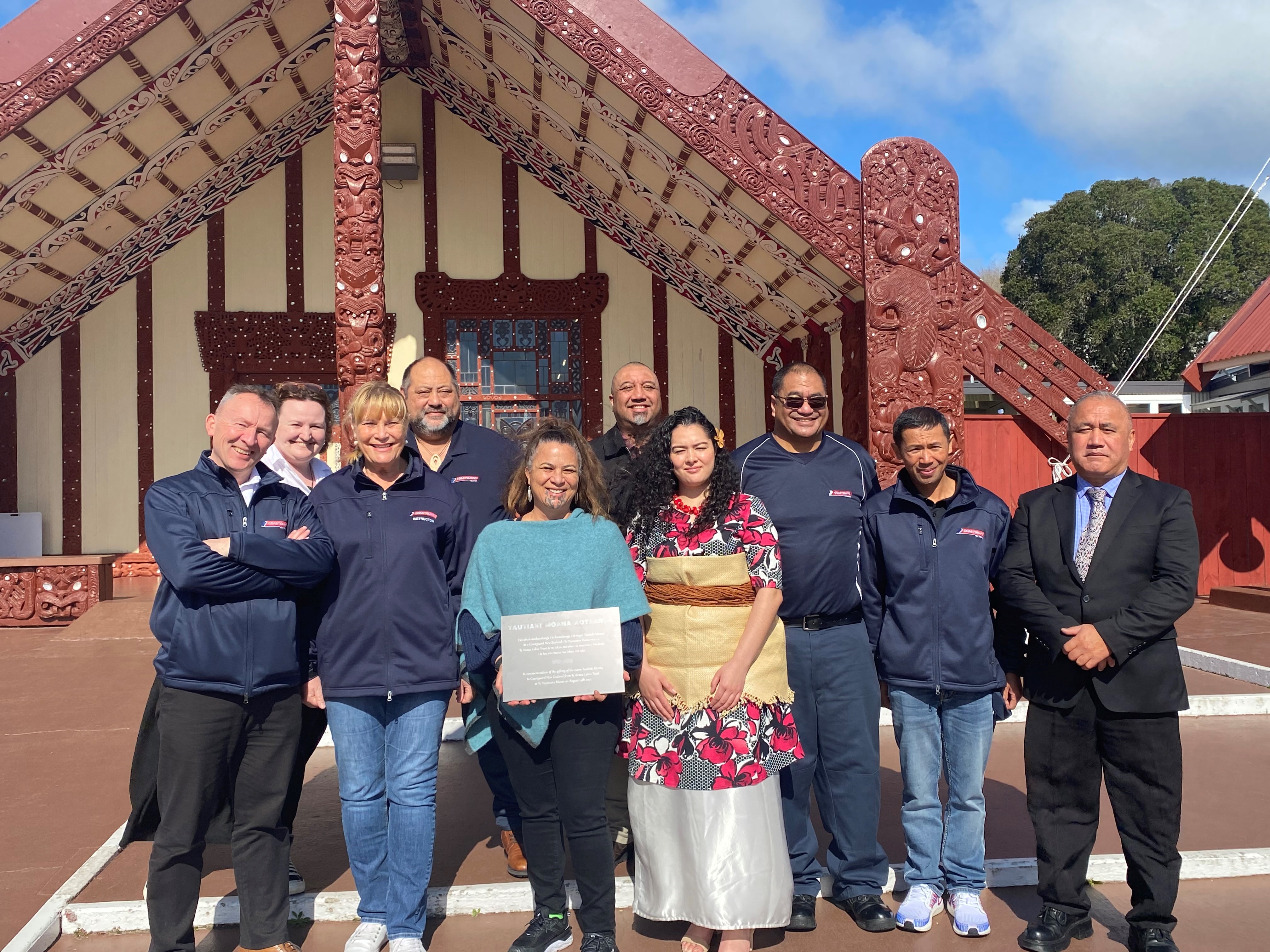
Journey into reflecting our communities
In 2019 Coastguard volunteers around the country completed a Volunteer Study, which gave us a greater understanding of them and their experiences.
One of the key recommendations from this survey was a strategy to attract a more diverse volunteer base. We recognise the need to become a more inclusive organisation for people of every cultural background, age group and gender, and as such we should reflect the make-up of the communities we are working in around the country.
In the past 12 months we have created a Kaihautū Māori role and established a Māori and Pacific Advisory group, Te Pūhara Mana Iwi. This ropū (group) includes board members, staff and volunteers. They work to help us build relationships with iwi, Kaupapa Māori and Pacific groups throughout the country and provide guidance on how we work better with those communities to improve outcomes.
As part of this mahi, all staff attended ‘Insights into Te Ao Māori’ training in March, culminating in a day at Ngāti Whātua Ōrākei Marae at Takaparawhau (Bastion Point).
This work has already enabled us to build strong relations with the Ngā Waka Federation in Tai Tokerau (Northland), Ngāti Whātua Ōrākei and Waikato Tainui, delivering our education courses and sharing our processes to enable those organisations to increase their own capacity in the safer boating space.
Old4New Lifejacket Upgrade
Coastguard’s Old4New Lifejacket Upgrade campaign is one of our leading water safety initiatives.
Old4New encourages safer boating by starting conversations about preparedness and wearing the right lifejacket for specific types of boating. With research showing that 1.7 million Kiwis are now on the water, the Old4New campaign is more relevant than ever.
For the first time, the 2020/2021 campaign saw two vans travelling the North and South Islands simultaneously.
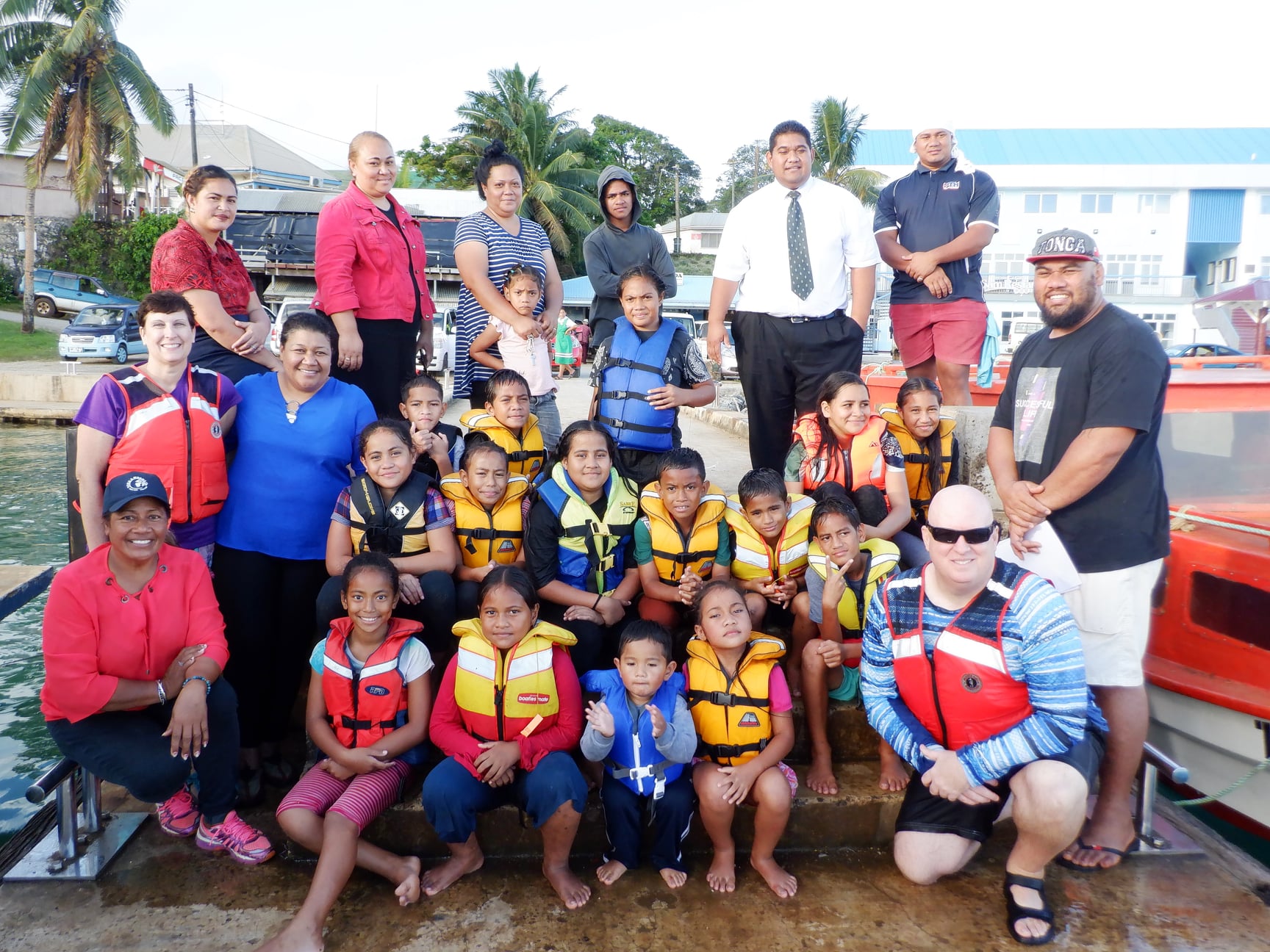
The team clocked over 10,000km, visiting 61 locations and upgrading 2,790 lifejackets. That’s 2,790 people safer on the water!
We also partnered with the Vava’u Volunteer Maritime Response Association in the Kingdom of Tonga to provide recycled fit-for-purpose lifejackets for their Life Vest Loaner Stations. This trial programme positions life vests at wharves around the island for anyone to borrow. The programme is in its infancy but we are committed to supporting it with recycled lifejackets as it grows.
Boating education
Coastguard saves lives by teaching Kiwis to make the most of our waters through our education programmes and community initiatives.
Each year we see a great number of New Zealanders engaging with our education courses and making the most of their time on the water. However, a large portion of the population, including our Māori, Pasifika and Chinese groups, continue to be over represented in the country’s drowning statistics. We know that the only way to reduce this number is to create accessible, meaningful programmes for these groups.
While we acknowledge that there is more to be done in this space, we are making strides to better connect with and provide learning opportunities by employing and continuing to support our Māori tutors, who have close links with iwi and Māori and Pasifika communities nationwide. We have also been publishing our learning materials bilingually (i.e. Māori and English) to help further support learners with their understanding of programme content, and using familiar environments such as marae and churches as venues so students feel more comfortable.

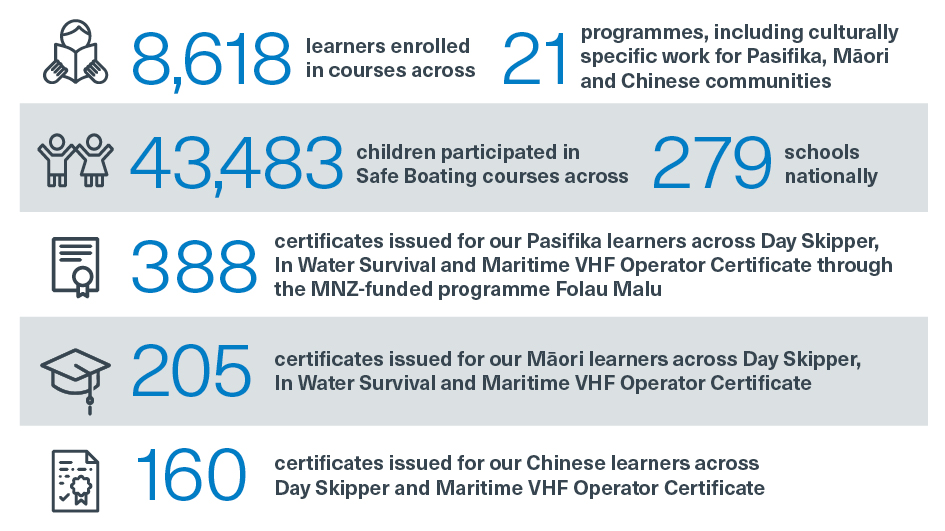
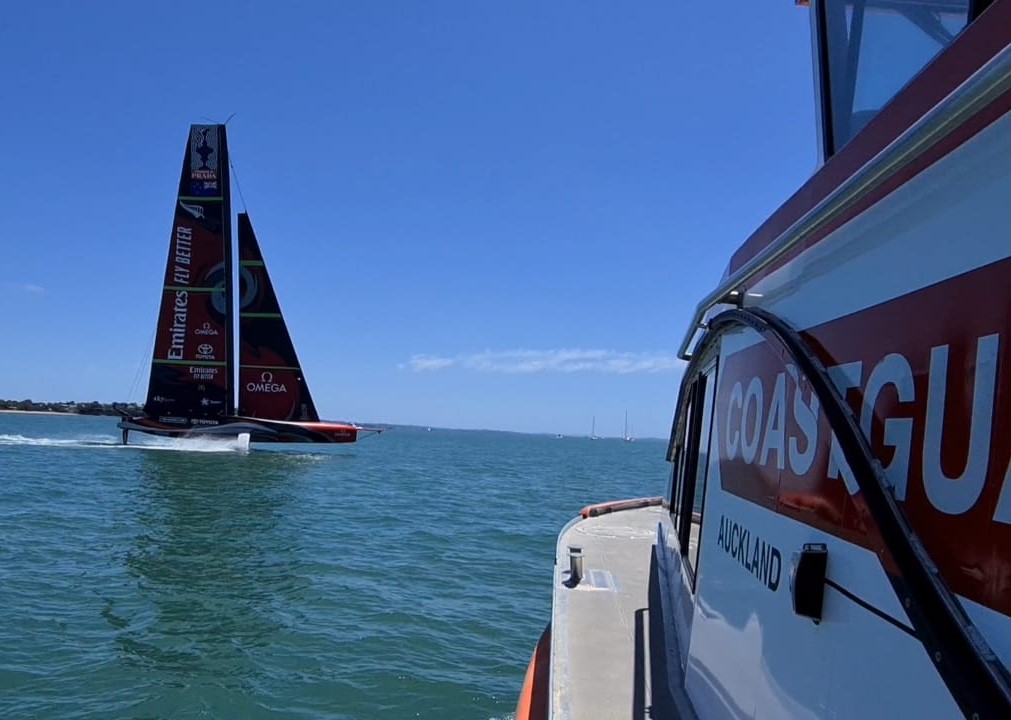
America’s Cup Support
When the Prada Cup and 36th America’s Cup graced Auckland’s Hauraki Gulf at the start of 2021, Coastguard volunteers were on the water keeping spectators safe alongside St John paramedics on board a number of Coastguard Rescue Vessels.
Coastguard volunteers the length and breadth of the country were invited to take part in the event and join a host crew from one of our Auckland-based Coastguard units.
The crews’ roles were vital in keeping people safe on the water and ensuring racing could go ahead without a hitch.
While this was a chance for Coastguard volunteers to be a part of a historic event, it was also an opportunity for our people to come together, exchange ideas and learn from each other.
As a result of the success of the experience, plans have been made by volunteers to do more reciprocal visits between units, which has always been a goal for Coastguard.
Our Work in Action
Coastguard Nelson
A last-minute dash to buy properly fitting lifejackets saved the lives of a Nelson family of four after their runabout was swamped by two large waves near Cable Bay.
Enjoying the last taste of the school holidays, dad Damien, stepmum Jackie, eight-year-old Rueben and six-year-old Summer decided to head out for a day of fishing.
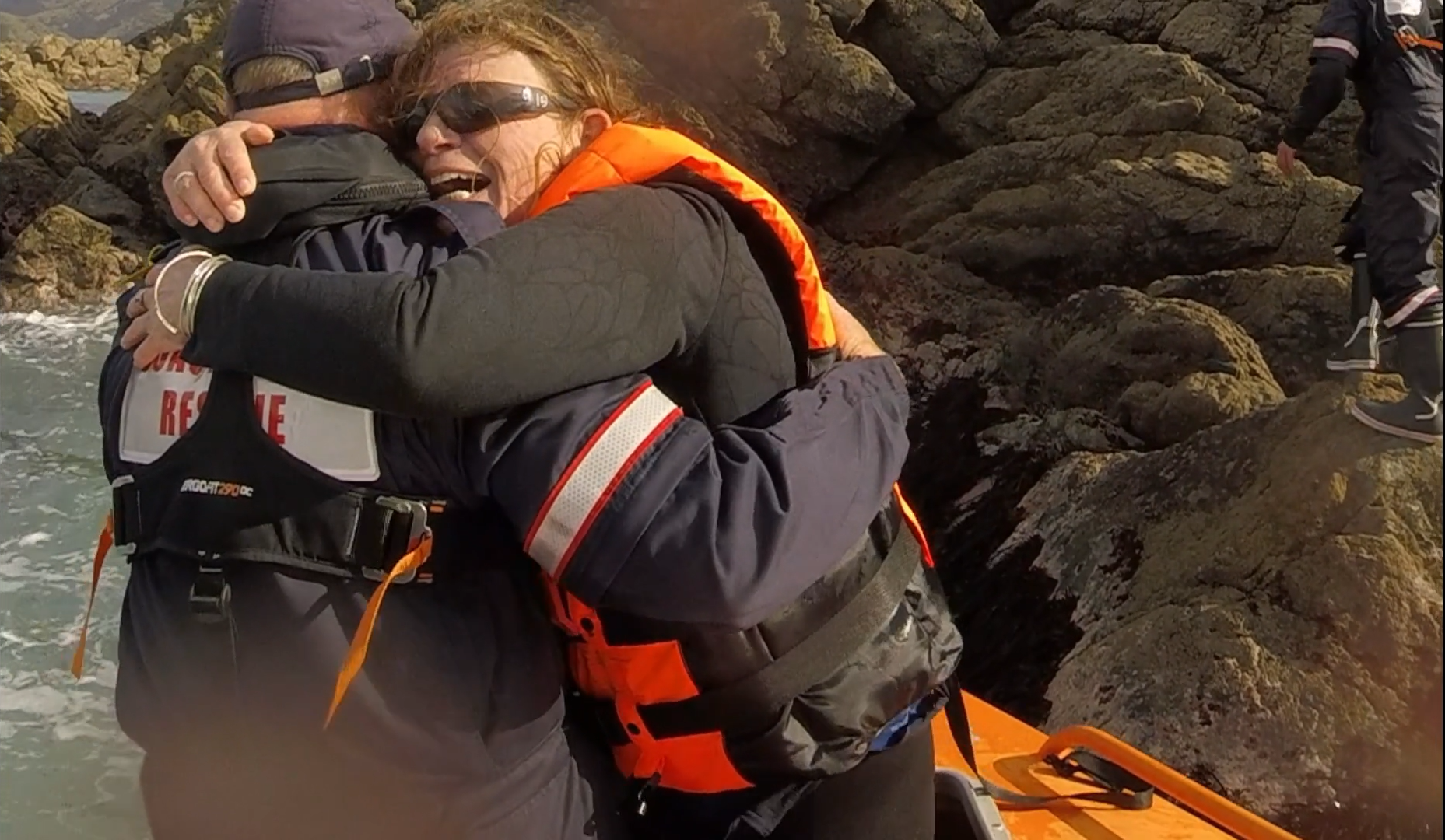
The family did all the right things for their fishing trip: they checked the weather forecast beforehand, wore their lifejackets, and had phones in waterproof bags. But despite this, their day on the water took a turn for the worse.
The weather changed quickly while they were out and on their return to shore two large waves crashed over the stern of their boat, swamping the motor and filling the boat up. Before the family could react, they were in the water clinging to their overturned boat, their lifejackets ensuring they remained above the surface.
After realising they were only drifting further away from land and not knowing if help was on the way, the family decided the best option for their survival was to abandon their boat and begin swimming 60 metres to nearby rocks.
Jackie and Damien took a child each and started the difficult swim. “Fighting the waves and fighting the current, it felt like we weren’t getting anywhere, we were making very slow progress,” recalls Jackie.
Unknown to the family, and thanks to a member of the public calling Police, a rescue effort was already well underway with Police Search and Rescue working with Coastguard and Surf Lifesaving.
Wet, cold and exhausted, the family eventually all made it to the rocks only to be faced with another danger, exposure.
Just as Damien was clambering onto the rocks to join the rest of his family who were all sheltering in a shallow crevice, Coastguard Nelson volunteers rounded the corner.
Jackie was relieved to hear the motor of the Rescue Vessel. “We were very grateful to see them, very exhausted, very cold and very appreciative!”
The strong current and large waves made reaching the area a difficult task for the Coastguard Nelson volunteers. The crew had to strategically time their approach, working with the large swell to avoid crashing into the rocks and to ensure they had enough time to safely uplift the family.
As experienced boaties, Jackie and Damien made sure their whole family was wearing properly fitted lifejackets. Knowing Summer had outgrown hers, the family picked up a brand-new lifejacket for their youngest child before they hit the water. This decision saved her life with Coastguard Nelson President Peter Kara saying the family wrote their own survival story.
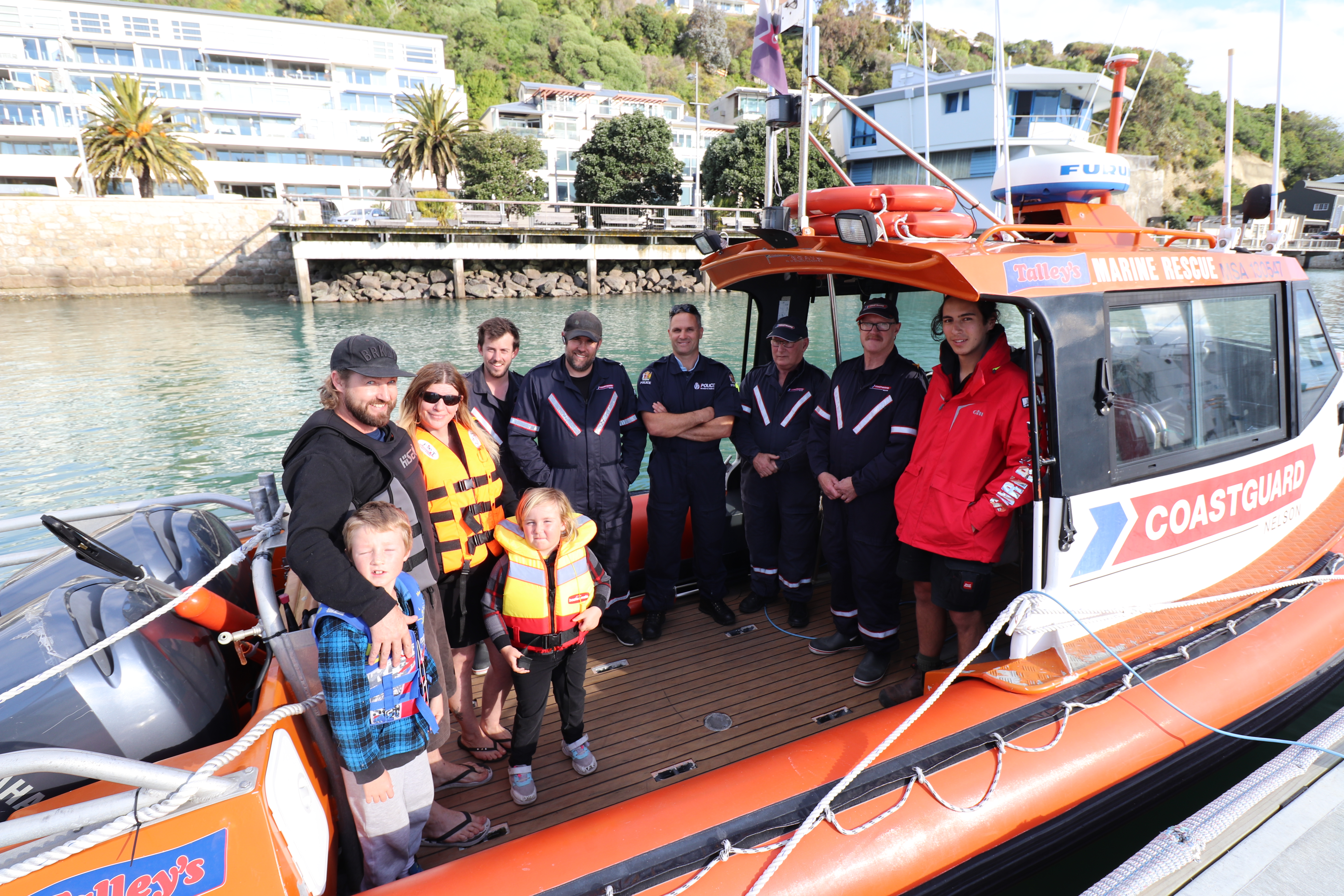
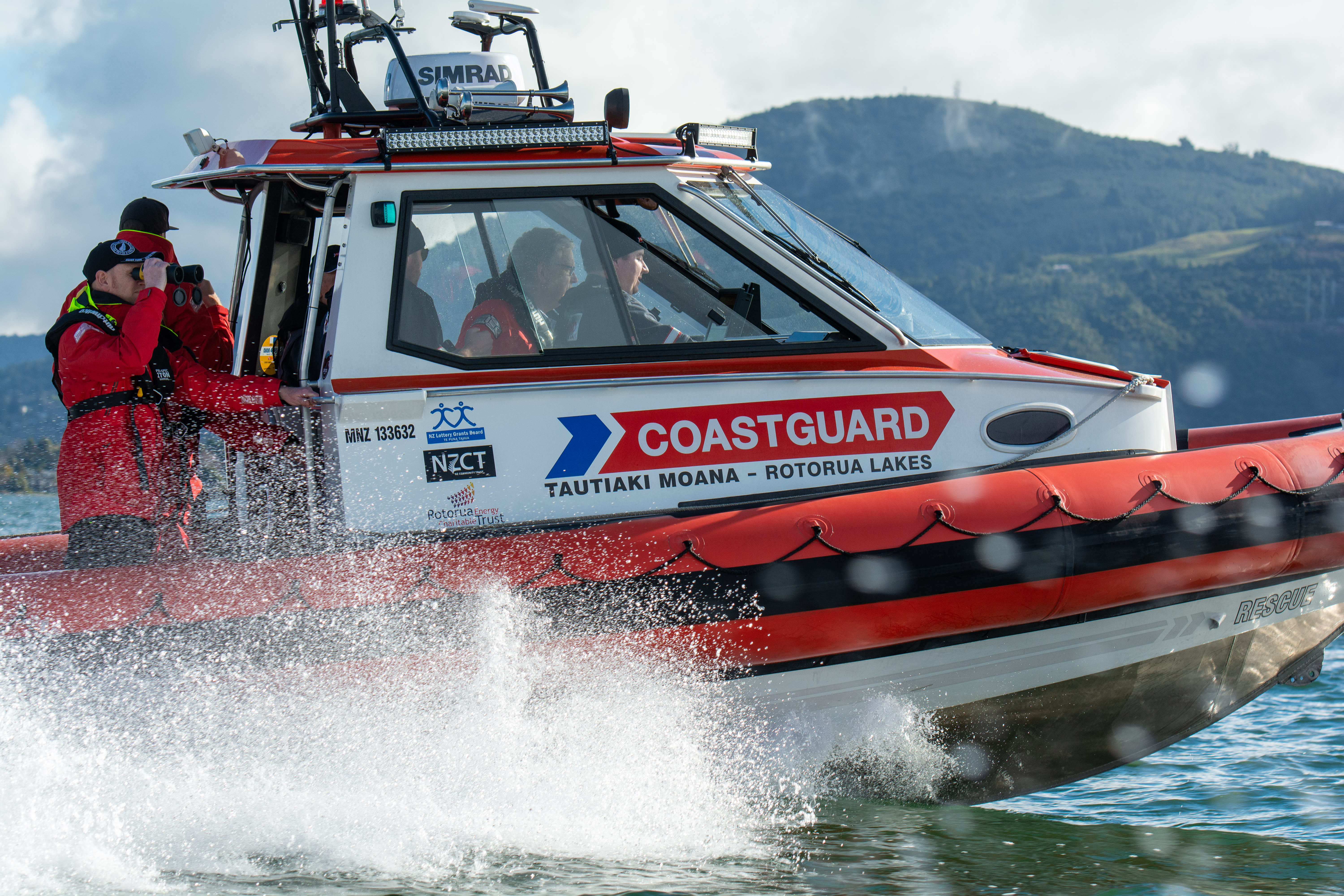
Coastguard Rotorua Lakes
Coastguard volunteers who crew our rescue vessels, take to the skies in our search aircraft and man our radio channels, are there for Kiwis 24 hours a day, seven days a week.
Boxing Day 2020 was no different when a seriously injured father and daughter clinging together in Lake Rotorua were sure they would become another statistic.
The father and daughter had set off on their jet ski in calm conditions, but around 300 metres offshore, the wind came up out of nowhere and conditions on the lake changed dramatically.
They decided to head back into shore when suddenly they were hit side on by a wave and thrown from their jet ski. The pair hit the choppy water hard, sustaining chest injuries from the blow, but luckily their lifejackets ensured they stayed afloat.
As they attempted to get their heads around what just happened, they quickly realised the strong wind had blown their jet ski well out of reach. After swimming a short distance to try and catch the jet ski, the father, a medical doctor, was experiencing worsening chest pains. He knew for sure that he had broken his ribs.
By this stage the situation had become more desperate as the waves were now crashing over their heads. In fear of drifting apart , the pair decided to tie their lifejackets together just in case one of them lost consciousness. They spent the next two hours floating helplessly in the lake, doing everything they could to stay alive.
“My dad and I were hypothermic, both of us had chest injuries, and were struggling to survive. I was especially concerned for my dad who was getting quieter and bluer as he inhaled water he couldn’t cough up,” said the daughter. “We were preparing for the end and saying our goodbyes.”
Meanwhile, on shore a search and rescue operation was gearing up. Six Coastguard Rotorua Lakes crew members met at the unit shed, launched the rescue vessel and, within 15 minutes, were out on the lake fighting large waves and rough conditions.
When Coastguard volunteers brought the pair on board the Rescue Vessel, it was clear they were in bad shape. Neither could stand, they could barely talk and the father’s condition was deteriorating quickly. The Coastguard crew immediately called the St John Ambulance to meet them back on shore.
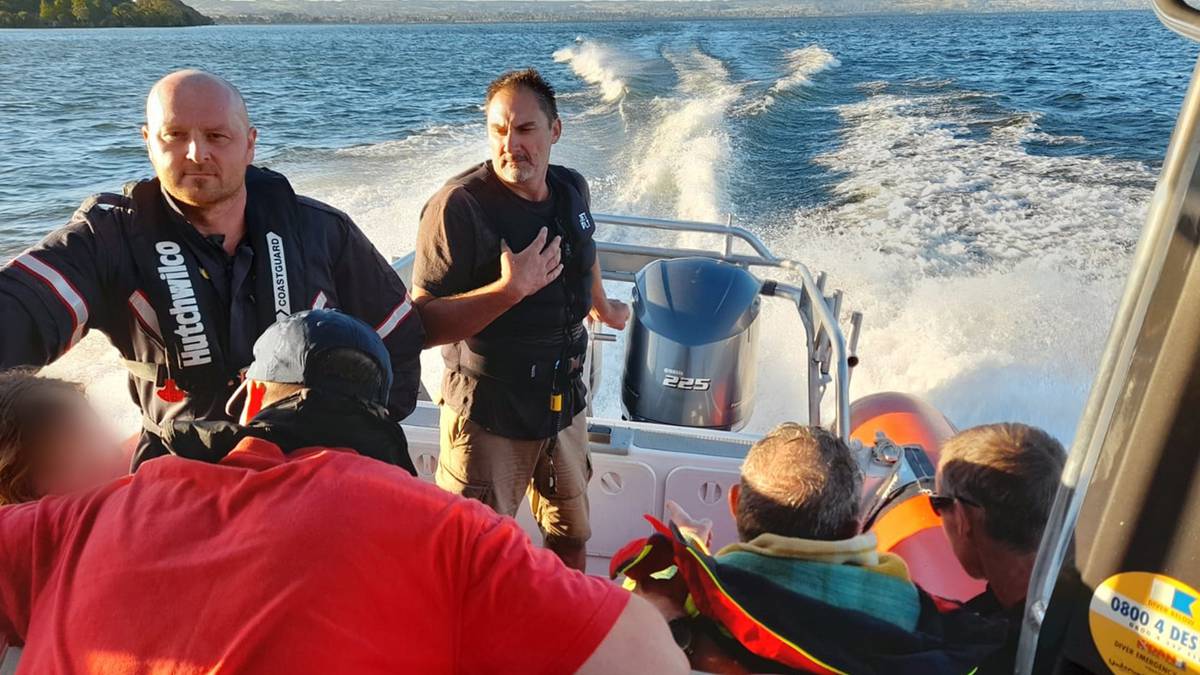
Coastguard Rotorua Lakes volunteer Jonathan Findon was one of the Coastguard crew on scene that day. “There’s a lot of things that came together to keep them alive, especially us getting on the water as fast as we did when we were paged. I think they know how lucky they were.”
“ I would like to give a heartfelt thanks to all those involved in picking my daughter and I out of the lake. We were, I believe, about 10 minutes away from being another statistic. I shall always remember seeing the bow wave as you approached us. You have really made
big difference to many people. Thank you.”
“ I can’t express in words how happy we were to see your boat. While a lot of the event is a blur, I will never forget your faces. You are the reason my sisters still have a father, my husband still has a wife, and my mother still has her daughter. You saved our lives, and for that I, and my family, are eternally grateful. You are truly heroes.”
Coastguard Auckland, Howick and North Shore
Volunteers on three Coastguard vessels played a pivotal role in keeping American Magic from sinking on January 17 after the US Challenger for the America’s Cup dramatically capsized during Prada Cup racing.
Rescue Vessels from Coastguard Howick, Coastguard North Shore and Coastguard Auckland came to the aid of the stricken yacht after it was damaged during the incident and quickly began to take on water.
Just seven minutes after the capsize occurred, Coastguard Howick was alongside American Magic providing the yacht with water pumps and a Coastguard volunteer crew member to offer assistance.
“Coastguard Howick was well positioned on the course to quickly respond,” said John Cowan, Coastguard Coordinator for the On Water Operations Centre (OWOC). “As they came alongside American Magic, the crew began calling them in to help.”
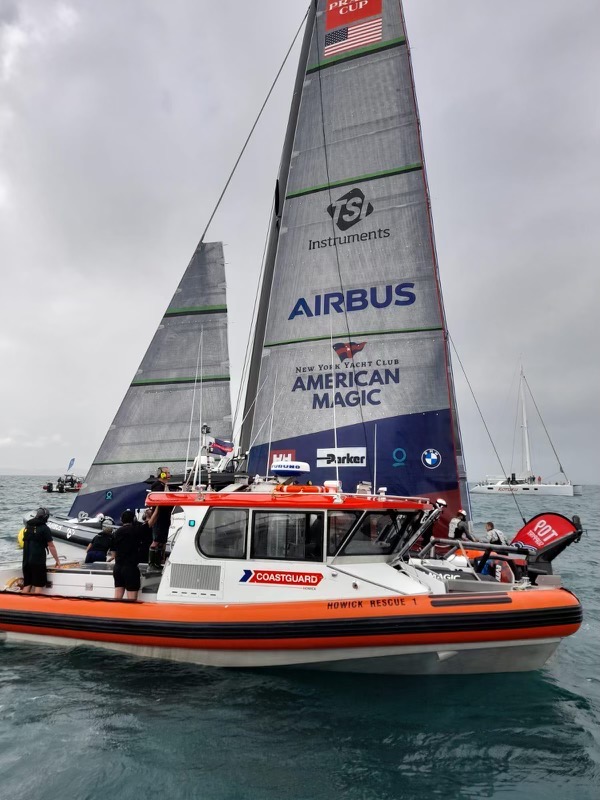
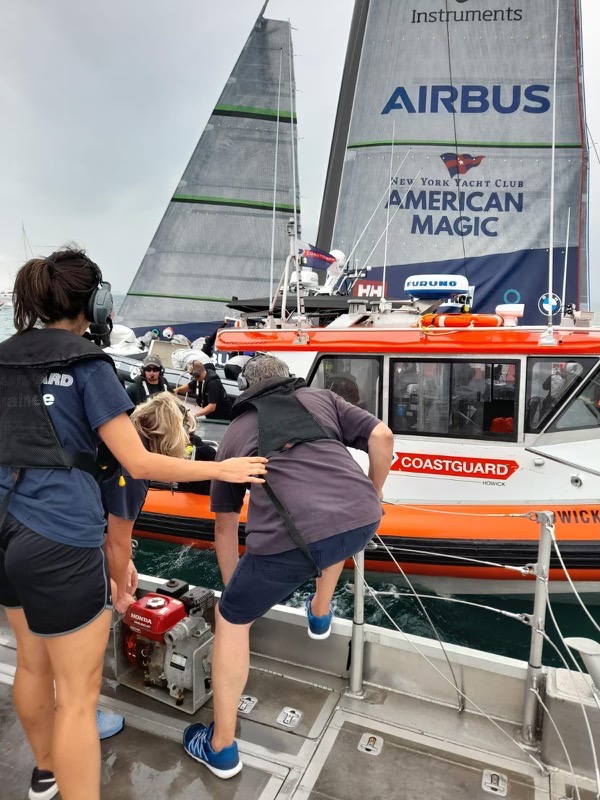
Coastguard Howick were quickly joined by Coastguard Auckland volunteers on board Lion Foundation Rescue, which also transferred one crew member and additional pumps to American Magic in an effort to keep the yacht from completely sinking.
Coastguard North Shore then joined the response as it became apparent that even more pumps were required as well as fuel to keep them all running.
“Initially there was no ability to communicate with the crew on American Magic so having the two Coastguard volunteers on board provided an important communication link with the On Water Operations Centre,” said John. “We were getting really good updates as to what was needed on board in terms of additional pumps, fuel and flotation and, with the combined efforts of the agencies in the On Water Operations Centre, we were able to get the required additional equipment from Police and the Fire Service down to the Auckland Marine Rescue Centre and out to American Magic.”
Over the next hour the three Coastguard vessels continued to work together alongside Emirates Team New Zealand, the Harbourmaster, Police and Fire and Emergency to pump the water from American Magic and install inflatable fenders, with the yacht regaining some buoyancy not long after 7pm. Approximately two hours after American Magic capsized it was sufficiently stabilised to attempt a tow.
Just seven minutes after the capsize occurred, Coastguard Howick was alongside American Magic providing water pumps and assistance.
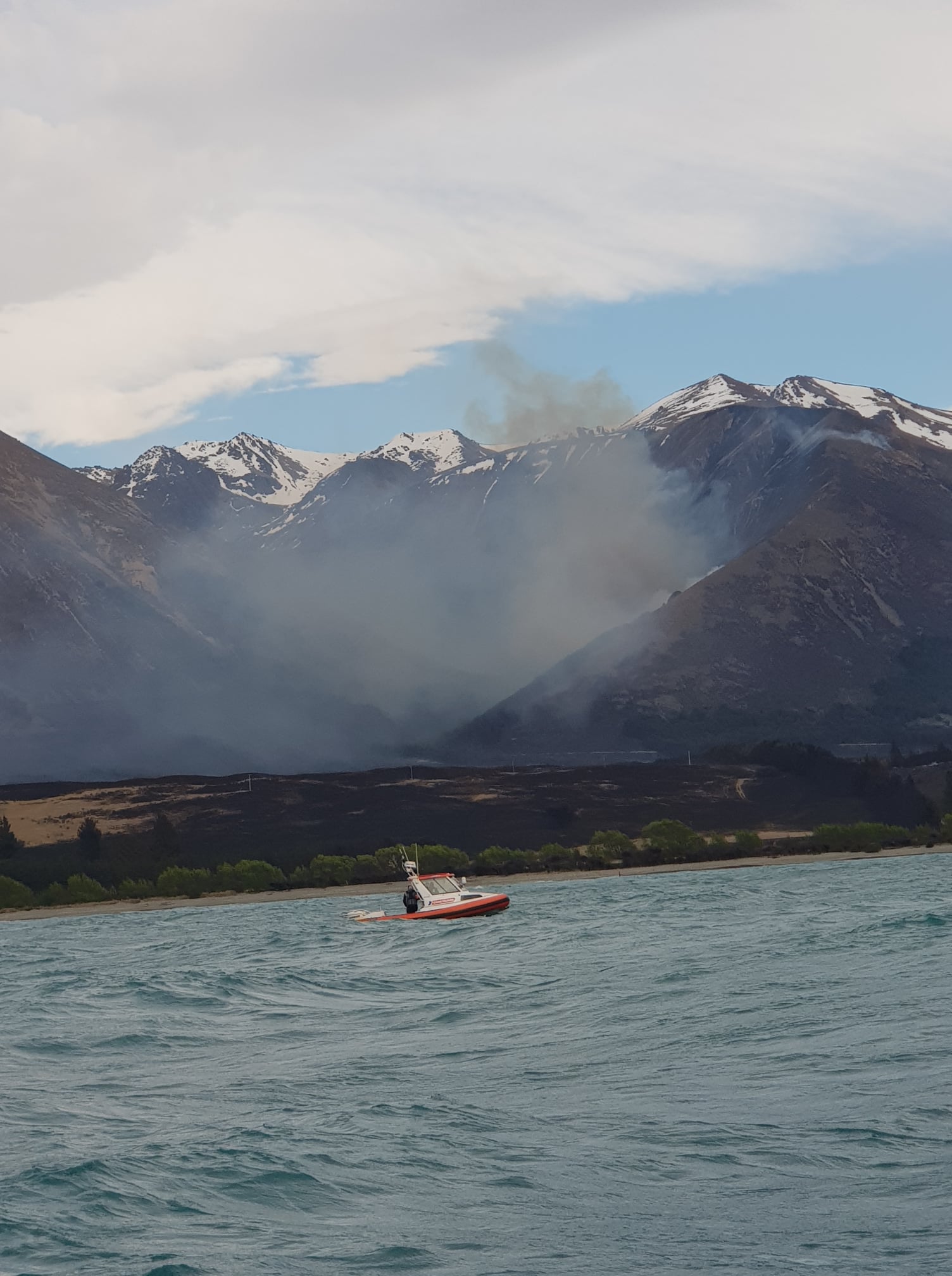
Coastguard Mackenzie Lakes, Wanaka Lakes, Queenstown, South Canterbury and Dunedin
On Sunday 4 October 2020, Coastguard volunteers in and around the Twizel area responded to the devasting wildfire that tore through the Lake Ōhau community destroying over 5,000 hectares of land and leaving 46 homes uninhabitable.
As first responders, Coastguard volunteers can often find themselves supporting emergency services in a range of unique situations where keeping communities safe is reliant on the combined skill of multiple agencies.
This particular response saw 10 Coastguard volunteers from the Twizel and Tekapo communities spend 12 grueling hours supporting rescue choppers on Lake Ōhau. Coastguard’s role was to keep watch in dipping areas in case aircraft went into the water and keep any recreational vessels away from the restricted area where the helicopters were filing up monsoon buckets.
Ten volunteers from Coastguard Wanaka Lakes, Queenstown and Clyde also offered their assistance and returned to the water at first light the next day to continue their taxing but vital supporting role.
The strong wind rolling through the area meant rescue helicopters couldn’t always be in the air battling the blaze. Coastguard volunteers were on the water regardless, facing the full strength of the wild wind and rough conditions as they kept watch on the lake, where in some parts waves were up to four metres high.
After nearly 24 hours of fighting one of the country’s biggest wildfires into the night and at first light on Monday morning, the fires were contained and Coastguard crews were stood down. However, volunteers from Coastguard Mackenzie Lakes remained on standby in case their assistance was needed once again.
Our responding Coastguard volunteers showed just how important teamwork is in response to an emergency, both with our crew on board a Rescue Vessel and with our emergency service partners.
Coastguard volunteers were on the water regardless, facing the full strength of the wild wind and rough conditions
Next section
Financially Strong
